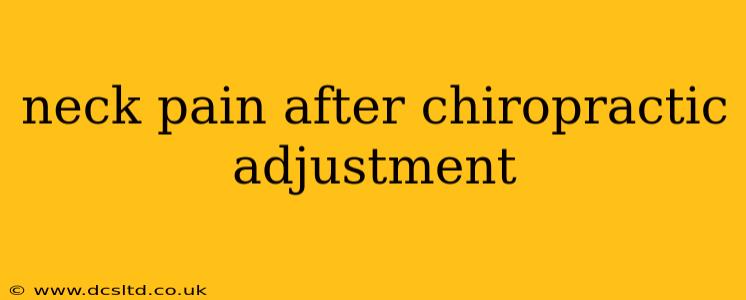Neck pain is a common ailment, and many seek chiropractic adjustments for relief. While chiropractic care often provides significant pain relief, some individuals experience temporary neck pain after their adjustment. This isn't necessarily a cause for alarm, but understanding why it happens and how to manage it is crucial. This comprehensive guide will explore the potential causes, provide practical advice for managing discomfort, and help you determine when to seek further medical attention.
Why Does My Neck Hurt After a Chiropractic Adjustment?
This is a frequently asked question, and the answer isn't always straightforward. Several factors can contribute to post-adjustment neck pain:
-
Muscle Soreness: Chiropractic adjustments often involve manipulating the joints in your neck, which can cause temporary muscle soreness. This is similar to the muscle ache you might feel after a strenuous workout. It's usually mild and subsides within a day or two.
-
Ligament Stretching: Similar to muscle soreness, the ligaments supporting your neck joints might experience some mild stretching during the adjustment. This stretching can lead to temporary discomfort.
-
Inflammation: The adjustment process can sometimes trigger a localized inflammatory response, resulting in some pain and stiffness. This is typically short-lived.
-
Underlying Condition: In some cases, the neck pain might be related to an underlying condition that the adjustment is attempting to address. While the adjustment aims to improve the situation, the initial response might involve some temporary exacerbation of symptoms before improvement is seen.
-
Improper Adjustment Technique: While rare, an improper adjustment technique could contribute to post-adjustment pain. This highlights the importance of choosing a qualified and experienced chiropractor.
Is Neck Pain After a Chiropractic Adjustment Normal?
While some level of discomfort is not uncommon, experiencing significant or prolonged pain is not considered normal. Mild soreness or stiffness that resolves within 24-48 hours is generally expected. However, persistent, severe, or worsening pain warrants a follow-up with your chiropractor.
How Long Does Neck Pain After a Chiropractic Adjustment Last?
The duration of post-adjustment neck pain varies greatly depending on the individual, the nature of the adjustment, and any underlying conditions. For most people, any discomfort is mild and lasts only a few hours or a day or two. If pain persists beyond a few days, or if it worsens, it's essential to contact your chiropractor.
What Can I Do to Relieve Neck Pain After a Chiropractic Adjustment?
Several self-care strategies can help manage post-adjustment neck pain:
-
Rest: Avoid strenuous activities that could exacerbate the pain. Gentle rest is key to allowing your body to heal.
-
Ice: Applying ice packs to the affected area for 15-20 minutes at a time can help reduce inflammation and pain.
-
Heat: After the initial 24-48 hours, gentle heat application might provide relief by relaxing muscles.
-
Over-the-counter pain relievers: Ibuprofen or acetaminophen can help manage pain and inflammation.
-
Gentle Stretching: Once the initial inflammation subsides, gentle neck stretches can help improve range of motion and reduce stiffness. Always consult your chiropractor before starting any stretching routine.
When Should I See a Doctor After a Chiropractic Adjustment?
Seek immediate medical attention if you experience:
- Severe or persistent pain: Pain that doesn't improve or worsens significantly.
- Numbness or tingling: This could indicate nerve involvement.
- Headache: Sudden or severe headaches could be a sign of a more serious issue.
- Weakness or difficulty moving your neck: These symptoms warrant immediate attention.
Can I do anything to prevent neck pain after a chiropractic adjustment?
Communicating openly with your chiropractor is crucial. Discuss any concerns or pre-existing conditions before the adjustment. Following your chiropractor's post-adjustment recommendations carefully can also minimize the risk of discomfort. This might include specific exercises or lifestyle modifications.
This information is for general knowledge and does not constitute medical advice. Always consult with your healthcare provider or chiropractor for any concerns about your neck pain or treatment. They can provide a personalized assessment and develop an appropriate management plan.
